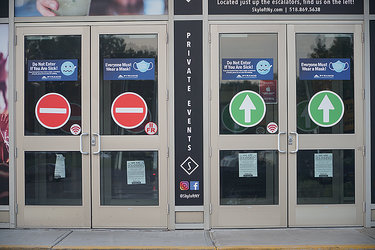
GUILDERLAND — Claiming that the timing of the first appearance of coronavirus and nature of pandemics in general are not reasons for cutting the assessed value of Crossgates Mall by nearly half, the town of Guilderland has asked Albany County Supreme Court Justice Margaret T. Walsh to dismiss the lawsuit brought by three Crossgates-affiliated limited-liability corporations.
All of the paperwork filed by the town and mall will go to Justice Walsh for a decision on Oct. 16, but her ruling on the matter might not be handed down for another 60 days.
Crossgates filed its petition against the town in August.
The mall argued it should receive a $139 million reduction on its $282 million assessed value because, “Prior to the issuance of the Town’s tentative assessment roll for 2020, [Crossgates] provided and offered information to the Town’s Assessor concerning the Property and its value, and advised the Assessor that the Property’s value had declined year-over-year due to continuing pressure on its ‘bricks-and-mortar’ business from e-commerce, sales declines, and record bankruptcies, and store closures, particularly for department stores and fashion retailers that were once the primary focus of [Crossgates’] business.”
As part of its Oct. 8 answer to Crossgates, the town has demanded the mall provide proof its property “is not income producing.”
According to the latest Securities Exchange Commission filings associated with the three mortgage loans (worth a cumulative $263 million) Crossgates holds on the property, the mall had an unaudited net operating income for the first six months of 2020 of $5.8 million; for the same period in 2019, that number was nearly $15 million.
The suit went on to claim that “fair market value of the Property … had also been negatively affected by the devastating impact of the COVID-19 pandemic catastrophe on the condition of the Property.”
Guilderland focuses its argument for dismissal on Crossgates’ COVID-19 claims.
The town disputes Crossgates’ claim that the condition of its property had been “adversely affected” by COVID-19 because the pandemic, however early it may have begun, still occurred “outside the scope” of the town’s 2020 assessment on the land.
The town claims that Crossgates’ argument about COVID-19 having been “circulating for ‘a least several months’ in China” by early January and its arrival in United State in late January, and the “wide-spread presence of the virus” in New York State, as of March 1 — the taxable status date, which reflected the condition of the property as of that date — were moot because “the Valuation Date for the 2020 property tax assessment was July 1, 2019, long before COVID-19 was even reported in the United States.”
Crossgates’ argument for seeking an assessment reduction “based on ‘the Covid-19 pandemic’” also fails on the facts, the town states, because, according to New York State property law, “the grounds for reviewing an assessment shall be that the assessment to be reviewed is excessive, unequal or unlawful, or that real property is misclassified.”
And nowhere in the New York state statute governing assessments are COVID-19 and pandemics listed as “a proper basis upon which” the owners may seek to have their property value reduced, the town claims.
The town also argues that the case should be dismissed because Crossgates’ petition relies on facts and events that were not presented to the Guilderland Board of Assessment Review when it heard the mall’s assessment challenge on May 20.
Malls in New York State were closed by the governor on March 19.
In its petition, Crossgates claims “the impact of that closure,” which lasted until July 10, seven weeks after the Board of Assessment Review heard its assessment challenge, “and of the continuing market risks arising from the still ongoing COVID-19 pandemic catastrophe, will continue to impact the value of the Property for the foreseeable future.”
Guilderland argues that Crossgates “cannot rely on facts not presented to the BAR [Board of Assessment Review], namely, those occurring after their May 2020 submission and/or those facts not submitted to the BAR for its consideration.”
The town also says the case should be tossed because no one from the limited-liability corporation that owns the property signed off on the suit, as is required by state property law.
Guilderland claims that state property law “provides that a petition to review an assessment ‘shall be duly verified by the petitioner, an officer thereof, or by an agent thereof who has been authorized in writing to verify and file such petition and whose authorization is made a part of such petition.’”
With no one from either Crossgates Mall General Company Newco, LLC; Crossgates Mall Devco LLC; or PCC Newco LLC having signed the July 27 petition filed in Albany County Supreme Court, the town argues, it’s “not properly verified and fails to comply” with state property law.
Published by The Altamont Enterprise





